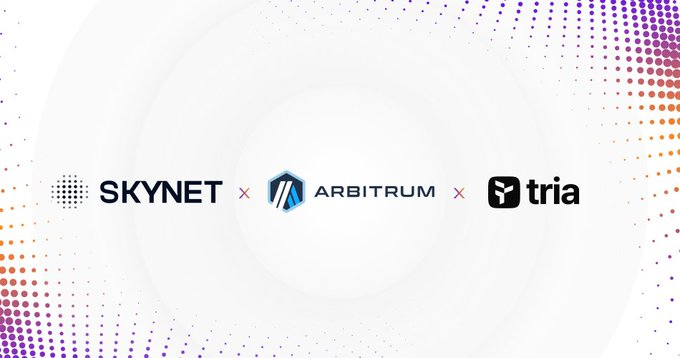On the 12th of December, 2024, Arbitrum announced the collaboration of Skynet and Tria. This partnership built on Arbitrum’s orbit focuses on unlocking the potential of AI agents and enabling them to interact with the real world.
Skynet, is a decentralized protocol that provides on-demand global resources for AI agents, and Tria, is a consumer-focused platform that simplifies blockchain interactions through chain-abstraction solutions. Using Arbitrum’s Orbit customizable Optimistic rollup-based framework, Skynet and Tria seek to remove the barriers that restrict AI agents from becoming active participants in global industries. This project also seeks to unleash massive productivity for businesses worldwide.
Right now, the AI agents sector is booming and is estimated to grow even larger by 2030, adding an expected $16 Trillion to the global economy. Despite predictions of global tech leaders like Mark Zucherberg, that AI agents will outnumber the human population and take over jobs, AI still faces several challenges that cancel out these opinions.
Challenges AI Agents Face:
- Poor Explanation and Transparency: AI agents’ decision-making and explanations can be very unclear, making it difficult to understand its reasoning. This lack of transparency can lead to mistrust and further hinder full adoption, as humans know they can not fully rely on the informations provided by the AI agents.
- Data Quality and Availability: So many AI agents do not operate with up-to-date information. According to a report by McKinsey poor data costs businesses an average of $15million annually. AI agents lack data quality and availability and this challenge hinders its massive adoption.
- Security and Trust: Another challenge AI agents face is security and trust. AI agents can be vulnerable to attacks, such as data poisoning, model inversion, or adversarial examples. Ensuring the security and trustworthiness of AI agents is crucial, especially in Web 3 applications.
Skynet and Tria understand these challenges and have devoted themselves to solve them. To address these issues, Skynet provides on-demand global resources for AI agents through its Smart Access Points that enable agents to tap into the services of any web2 or web3 organization—such as Booking.com, AWS, StackAI, MakeMyTrip, Shopify—and interact transparently and autonomously with resource providers.
On the other hand, Tria’s chain-abstraction interface enables agents to access assets, execute transactions, and engage with decentralized applications (dApps) across various virtual machines (VMs) without the need for multiple wallets, gas tokens, or bridging mechanisms. This enables seamless interactions across multiple blockchains and expands AI agents’ access to a broader range of services.
Skynet’s diverse payment mechanisms running as an Orbit chain on Arbitrum allow AI agents to execute seamless transactions, settle in USD and stablecoins, and control spending via payment limits based on their individual resource type while Tria’s BestPath AVS solution ensures that agents always navigate the most efficient pathways across diverse blockchain ecosystems to enhance adaptability and efficiency.
Tria’s built-in gas abstraction layer allows agents to transact with tokens from any chain, this way they eliminate payment barriers, simplify execution, and enable an AI agent-driven economy to drive innovation across industries.
This collaboration has endless use cases. Take for instance, in travel and hospitality, AI agents can book accommodations and manage itineraries across platforms, ensuring seamless experiences. In logistics and supply chains, AI agents can access cross-chain data, optimize routes, manage inventory, and track deliveries efficiently. In finance, they can interact with DeFi platforms, manage portfolios and optimize yields, and in healthcare, agents can coordinate appointments and securely share data across decentralized systems, improving patient care and reducing administrative burdens.
Don’t be left out of this new development. Check out their website for more information.

